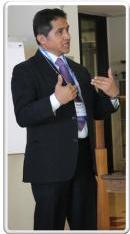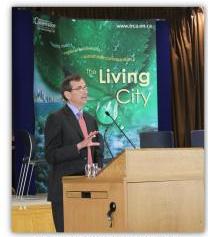May 20, 2013
A Reflection on the First Annual Climate Change Research Symposium
On May 13, 2013, the Ontario Climate Consortium (OCC) hosted the First Annual Climate Change Research Symposium which brought together a number of stakeholders including researchers, public/private sector organizations, and NGOs. The purpose of this event was to highlight the research underway in Ontario regarding climate change and to identify ways in which to further research and practice in response to its effects.
 In the morning, participants had the opportunity to hear from a number of speakers over the course of two sessions. In the first session, Patricia Koval from Torys LLP and Peter Clarke from the Co-operators Insurance Group provided participants with an overview of the legal and financial impetus behind why it is so important that private and public organizations alike recognize the incredible challenges posed by a changing climate. Dawn Conway from the Canadian Climate Forum (CCF) provided an overview as to how important research was in informing a response to the challenges posed by a changing climate. Recognizing that active collaboration is key to facilitating communication between the research community and practitioners the OCC was happy to be able to profile the work of the Pacific Climate Impacts Consortium (PCIC) in BC, Ouranos in Quebec, the Great Lakes Integrated Science Assessment (GLISA) based in Michigan, and Environment Canada (EC) right here at home. Presentations from Dr. Francis Zwiers (PCIC), Alain Bourque (OURANOS), Dr. David Bidwell, and Marjorie Shepherd (EC) and the other morning speakers are available here.
In the morning, participants had the opportunity to hear from a number of speakers over the course of two sessions. In the first session, Patricia Koval from Torys LLP and Peter Clarke from the Co-operators Insurance Group provided participants with an overview of the legal and financial impetus behind why it is so important that private and public organizations alike recognize the incredible challenges posed by a changing climate. Dawn Conway from the Canadian Climate Forum (CCF) provided an overview as to how important research was in informing a response to the challenges posed by a changing climate. Recognizing that active collaboration is key to facilitating communication between the research community and practitioners the OCC was happy to be able to profile the work of the Pacific Climate Impacts Consortium (PCIC) in BC, Ouranos in Quebec, the Great Lakes Integrated Science Assessment (GLISA) based in Michigan, and Environment Canada (EC) right here at home. Presentations from Dr. Francis Zwiers (PCIC), Alain Bourque (OURANOS), Dr. David Bidwell, and Marjorie Shepherd (EC) and the other morning speakers are available here.
Having worked with the Toronto and Region Conservation Authority (TRCA) over the last few months on an Ontario-wide scan of climate change research in Ontario (research completed since 2011), I recognize the importance of bridging the gap between the researchers and end-users of that research. One of the points that I took away from the morning sessions was the importance of targeting information to the end-user so that the information being disseminated was not only useful but usable as well.

Raul Ponce Hernandez from Trent University
After lunch, participants got to choose from 6 different breakout sessions. I myself took part in the “Climate Prognosis: Human Health and Climate Change” breakout. Speakers from York Universiy, the University of Toronto (School of Public Health), the Public Health Agency of Canada (PHAC), and Risk Sciences International (RSI) presented on a variety of climate-health issues in a panel moderated by Louise Aubin from Peel Public Health. The session covered a range of issues including the spread of Lyme disease in North America presented by Dr. David Fisman from the University of Toronto, as well as work on regional air-quality monitoring presented by Dr. Jacek Kaminski. What I took away from these presentations and those by Heather Auld (RSI) and Stephen Parker (PHAC) was the importance of responding to the human health impacts of climate change at the regional level while at the same time considering the global implications of climate change and its impact on human health.
From the human health session I was off to my second session of the day, “Climate Change: Eat, Drink and be Merry?” a session focused on examining some of the ways in which the agricultural sectors is dealing with climate change both from a mitigation and an adaptation perspective. The key message that I took away from this session was that if adaptation and mitigation are to occur in the agricultural sector in Ontario, a long-term strategy needs to be created so that modeling can be done to assess the impact of climate change in this sector on different crops. Something that stood out for me from this session was a prototype of a mapping tool developed by researchers and graduate students with no external funding. I think that this is a great example of the type of work that can be done by involving enthusiastic graduate students in climate change research. Personally, I developed a strong interest in environmental issues at the undergraduate level but it was the research that I conducted at the graduate level which really drew my interests towards climate change. Given the scale of the challenges that climate change has created means a wide variety of opportunities exist for students to hone their skills and consequently develop significant expertise in this field.

Keynote Speaker: Scott Vaughan, President and CEO of the International Institute for Sustainable Development (IISD)
After a full day of presentations from 28 speakers’ from 10 universities as well as a variety of public and private sector organizations the keynote address was delivered by Scott Vaughan, the President and CEO of the International Institute for Sustainable Development (IISD). In his presentation, Scott presented on the complex economic and financial issues associated with climate change both nationally and internationally. In his presentation, he discussed some of the investments being made to support climate change mitigation and adaptation and areas where more work is needed.
On the whole, I believe that the Symposium was quite successful. The participants had the opportunity to hear from a number of speakers about the impacts of climate change on their sector and the type of research that is being done to address these challenges. I certainly took a lot away from the workshops that I attended. While I was aware that climate change research was well underway in Ontario, I was not aware of the extent to which it is being conducted until I became involved in the planning process for this event and the scan of existing climate change research. The OCC intends to update this information on an ongoing basis and so should you be interested in contributing to its development please don’t hesitate to contact us.
 Simran Chattha completed her B.E.S. degree at York University. More recently, she graduated from the University of Guelph with an M.A. in Political Science specializing in Public Policy and Administration. Her research interests lie in the areas of environmental policy and climate change adaptation.
Simran Chattha completed her B.E.S. degree at York University. More recently, she graduated from the University of Guelph with an M.A. in Political Science specializing in Public Policy and Administration. Her research interests lie in the areas of environmental policy and climate change adaptation.






Comments are closed here.